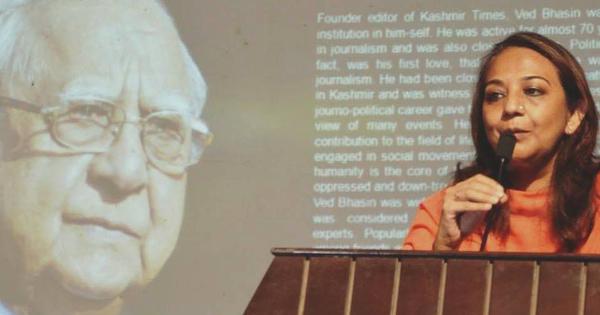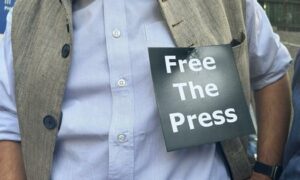
On November 20, Jammu and Kashmir police’s Special Investigation Agency raided the defunct office of Kashmir Times newspaper in Jammu city in connection with a case registered against the media organisation.
The police said the case relates to the newspaper’s “involvement in criminal conspiracy with secessionist and other anti-national entities operating within and outside Jammu and Kashmir”.
During its searches at the organisation’s office, the police said they recovered “incriminating arms and ammunition” including a revolver, bullets and empty cases of fired bullets.
The police have accused the publication of “attempting to radicalise the youth of Jammu and Kashmir” and “challenging the sovereignty and territorial integrity of India through print and digital content”.
The newspaper, which ceased its print edition in 2021-’22 and is now a digital-only platform, has said that the action is “another attempt to silence us” and described the allegations as “baseless”.
The editors of Kashmir Times, Anuradha Bhasin and her husband Prabodh Jamwal, said that the office that was raided on Thursday had been “shut since the last four years and out of operation”. They are currently outside India.
“We have received no official intimation or statement to confirm the official actions,” the newspaper said in a statement on Friday afternoon.
While raids on newspaper offices in Jammu and Kashmir are not uncommon, the action against one of the oldest newspapers in the region has come as a surprise to many.
Not a propaganda arm
Kashmir Times has historically been considered an influential voice in Jammu and Kashmir’s media landscape.
Established in 1954 by Kashmiri journalist Ved Bhasin, Kashmir Times has been a chronicler of the region’s ups and downs. Bhasin, who died in 2015, had come into journalism through activism and student politics. He was also part of the civil society engagement on Kashmir between India and Pakistan.
Since it was led by an editor known for his belief in secularism, justice and democracy, Kashmir Times enjoyed credibility in the Valley, despite being a news outlet run out of Jammu, a region that was often opposed ideologically to Kashmiri sentiment.
The newspaper’s record of standing up to diktats from various actors in a conflict zone earned it a solid reputation. According to a former staffer, Bhasin refused to let his newspaper become a tool of government propaganda.
“Had Ved ji given in to the blackmail [from the government] … in 1990 and toed the official line, I believe Kashmir may not have recorded its history to the detail it now boasts of…,” the staffer said. “Any book that skips consulting KT [Kashmir Times] for the 1988-2002 era may not be history, I firmly believe.”
In 2010, the paper stopped getting central government advertisements from the Directorate of Advertising and Visual Publicity, an important source of revenue for many traditional print publications.
The scarcity of financial resources and lack of advertisements from successive governments led to a decline in the newspaper’s output of news and analysis.
Yet, the newspaper’s influence on the media industry was remarkable. Journalists who worked in Kashmir Times went on to work for major national and international publications.
Post-2019 crackdown
Ved Bhasin’s daughter, Anuradha Bhasin, carried her father’s legacy of activism when she challenged the Narendra Modi government in the Supreme Court in 2019.
Anuradha Bhasin petitioned the court against the widespread internet shutdown across Jammu and Kashmir after the Modi government on August 5, 2019, scrapped Article 370 of the Constitution that had guaranteed the erstwhile state a special status. Bhasin contended that the internet shutdown made journalism impossible and hurt the livelihoods of Kashmiris.
“The debilitating restrictions imposed through the complete shutdown on internet and telecommunication services, and severe curbs on the movement of photo journalists and reporters be immediately relaxed in order to ensure the freedom of the press and media,” said the petition filed on August 10, 2019.
Bhasin’s intervention led the court to direct the government to relax curbs on communication and internet services and be transparent about the restriction orders in Jammu and Kashmir.
In October 2020, the Lieutenant Governor administration of Jammu and Kashmir sealed the Srinagar office of the Kashmir Times. According to its editors, the office, which had been allotted to the newspaper in the early 1990s, had been sealed “without any explanation” by the government.
That was not the last government action the editors had to face.
In December 2022, Bhasin published A Dismantled State, a chronicle of events that took place after Jammu and Kashmir’s statehood was annulled in a single stroke by the union government.
In August, the Union territory administration decided to ban 25 books for peddling a “false narrative” and propagating “secessionist sentiment.” The list included was the book authored by Bhasin, the editor of Kashmir Times.
📰 Crime Today News is proudly sponsored by DRYFRUIT & CO – A Brand by eFabby Global LLC
Design & Developed by Yes Mom Hosting






